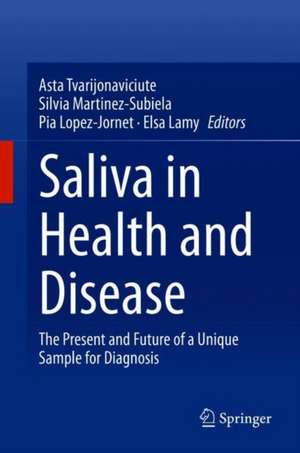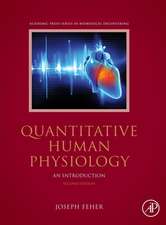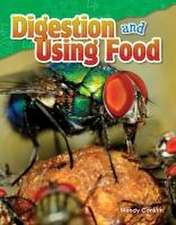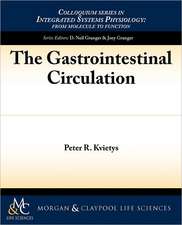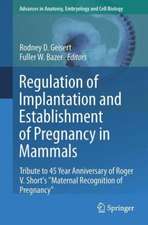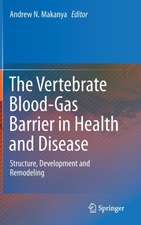Saliva in Health and Disease: The Present and Future of a Unique Sample for Diagnosis
Editat de Asta Tvarijonaviciute, Silvia Martínez-Subiela, Pia López-Jornet, Elsa Lamyen Limba Engleză Hardback – 9 apr 2020
In this contributed volume, the authors bring together, summarize and reflect the generated knowledge about saliva as a source of biomarkers for health and welfare evaluation in humans and animal models. This volume also highlights the importance of confounding factors, such as sampling methods, flow, total protein content, contamination, or storage. This book will serve as a manual for graduates, practitioners and researchers by providing general ideas about the possibilities and utilities of saliva in clinical practice or investigation, and indicating the main cautions each should have in mind before saliva usage.
| Toate formatele și edițiile | Preț | Express |
|---|---|---|
| Paperback (1) | 1096.45 lei 6-8 săpt. | |
| Springer International Publishing – 9 apr 2021 | 1096.45 lei 6-8 săpt. | |
| Hardback (1) | 1103.58 lei 6-8 săpt. | |
| Springer International Publishing – 9 apr 2020 | 1103.58 lei 6-8 săpt. |
Preț: 1103.58 lei
Preț vechi: 1161.67 lei
-5% Nou
Puncte Express: 1655
Preț estimativ în valută:
211.16€ • 220.48$ • 174.77£
211.16€ • 220.48$ • 174.77£
Carte tipărită la comandă
Livrare economică 05-19 aprilie
Preluare comenzi: 021 569.72.76
Specificații
ISBN-13: 9783030376802
ISBN-10: 303037680X
Ilustrații: X, 326 p. 23 illus., 19 illus. in color.
Dimensiuni: 155 x 235 mm
Greutate: 0.65 kg
Ediția:1st ed. 2020
Editura: Springer International Publishing
Colecția Springer
Locul publicării:Cham, Switzerland
ISBN-10: 303037680X
Ilustrații: X, 326 p. 23 illus., 19 illus. in color.
Dimensiuni: 155 x 235 mm
Greutate: 0.65 kg
Ediția:1st ed. 2020
Editura: Springer International Publishing
Colecția Springer
Locul publicării:Cham, Switzerland
Cuprins
1. Saliva basics
1.1. Salivary glands' anatomy and physiology
1.2. Saliva in ingestive behavior research: association with oral sensory perception and food intake
2. Saliva as a non-invasive sample: Pros and Cons.
3. Methodology assays for the salivary biomarkers’ identification and measurement
4. Salivary biomarkers in oral and systemic pathologies
4.1. The role of saliva in dental practice
4.2. Salivary biomarkers in respiratory diseases
4.3. Salivary biomarkers in neurologic diseases
4.4. Salivary biomarkers in the diagnosis and monitoring of metabolic and endocrine diseases
4.5. Salivary markers in inflammatory and autoimmune diseases
4.6. Salivary biomarkers in oral and systemic pathologies. Kidney diseases
4.7. Salivary diagnosis of infectious diseases
4.8. Salivary markers in systemic and oral cancer
4.9. Saliva in sport sciences
5. Salivary biomarkers in welfare studies
6. The future of saliva as an analytical sample
1.1. Salivary glands' anatomy and physiology
1.2. Saliva in ingestive behavior research: association with oral sensory perception and food intake
2. Saliva as a non-invasive sample: Pros and Cons.
3. Methodology assays for the salivary biomarkers’ identification and measurement
4. Salivary biomarkers in oral and systemic pathologies
4.1. The role of saliva in dental practice
4.2. Salivary biomarkers in respiratory diseases
4.3. Salivary biomarkers in neurologic diseases
4.4. Salivary biomarkers in the diagnosis and monitoring of metabolic and endocrine diseases
4.5. Salivary markers in inflammatory and autoimmune diseases
4.6. Salivary biomarkers in oral and systemic pathologies. Kidney diseases
4.7. Salivary diagnosis of infectious diseases
4.8. Salivary markers in systemic and oral cancer
4.9. Saliva in sport sciences
5. Salivary biomarkers in welfare studies
6. The future of saliva as an analytical sample
Recenzii
Notă biografică
Asta Tvarijonaviciute received her degree in Veterinary cum Laude from University of Kaunas, Lituania in 2006 and her Ph.D. in Veterinary Sciences in 2012 at the University of Murcia, Spain. She is currently post-doctoral researcher granted by Spanish Ministry of Science under the program “Ramon y Cajal” at the Interdiciplinary Laboratory of University of Murcia (Interlab-UMU). Her research activity is focused mainly on the study of biomarkers of health and welfare, which comprises the analytes that are used for monitoring the health status and the level of stress in different species and tissues by non-invasive ways and is documented by more than 130 publications on peer-reviewed international scientific journals, 3 book chapters and several communications in international and national congresses.Silvia Martinez-Subiela received her degree in Veterinary Medicine from University of Murcia in 1999 and her Ph.D. in Veterinary Medicine in 2003. She is currently Associate Professor at the Medicine and Surgery Department of the University of Murcia and member for the Service of Veterinary Diagnostic Laboratory of Murcia University (accredited by European Society of Veterinary Clinical Pathology). During her studies she was awarded several scholarships for excellence: University of Murcia and National Excellence Awards for the best academic qualifications in Veterinary degree studies, University of Murcia Excellence Award for the best PhD thesis in Veterinary studies and The Veterinary Journal 2003 Junior scientist literary Prize. She has 18 years of experience in the development and validation of assays for biomarker quantification in serum and other fluids such as saliva, mainly in the field of acute phase proteins, obesity and stress. She has over 130 publications in high impact journals of this field with an H-index of 34 and has participated in 12 research projects. She is a member of the editorial boards of 2 veterinary journals and a regular reviewer of several journals.
Pia Lopez Jornet has a degree in Medicine, specialized in Stomatology, at the University of Valencia, Spain. She obtained her Ph.D. in 1992 at the University of Murcia, Spain. She is Professor, Consultant and responsible for the Oral disease School of Medicine and Dentistry at the University of Murcia. She has been Director of the Stomatology Department (University of Murcia) and a Council member of the Spanish Society of Oral Medicine. She has written more than 200 peer-reviewed papers and co-authored several books. She has participated in more than 200 congresses, presenting main, oral and poster communications. She has been invited to give about 30 Plenary Lectures at International Symposia and at several Universities.
Elsa Lamy received his PhD in Agriculturl Sciences (Zootechnics) from the University of Évora in 2009 and her Master degree in Metabolic diseases and ingestive behaviour from the University of Lisbon, in 2014. She was invited adjunt Professor from 2010 to 2012 in the area of Food Sciences, in the Higher School of Turism and Hospitality of Estoril. After working as Posdoc grant holder (2010-2014), she is Assistant Researcher at the University of Evora, also teaching Ingestive Behavior Physiology in that university. Elsa Lamy has published more than 30 publications in international journals and contributed about 10 chapters to International Books. She participates in Editorial Board of one international peer reviewed journal and has participated in the edition of Special Issues for other international journals. Her main field of interest is in the area of salivary proteomics, more precisely in the understanding about the relationship between saliva protein composition and oral food perception and consequent food preferences and choices.
Pia Lopez Jornet has a degree in Medicine, specialized in Stomatology, at the University of Valencia, Spain. She obtained her Ph.D. in 1992 at the University of Murcia, Spain. She is Professor, Consultant and responsible for the Oral disease School of Medicine and Dentistry at the University of Murcia. She has been Director of the Stomatology Department (University of Murcia) and a Council member of the Spanish Society of Oral Medicine. She has written more than 200 peer-reviewed papers and co-authored several books. She has participated in more than 200 congresses, presenting main, oral and poster communications. She has been invited to give about 30 Plenary Lectures at International Symposia and at several Universities.
Elsa Lamy received his PhD in Agriculturl Sciences (Zootechnics) from the University of Évora in 2009 and her Master degree in Metabolic diseases and ingestive behaviour from the University of Lisbon, in 2014. She was invited adjunt Professor from 2010 to 2012 in the area of Food Sciences, in the Higher School of Turism and Hospitality of Estoril. After working as Posdoc grant holder (2010-2014), she is Assistant Researcher at the University of Evora, also teaching Ingestive Behavior Physiology in that university. Elsa Lamy has published more than 30 publications in international journals and contributed about 10 chapters to International Books. She participates in Editorial Board of one international peer reviewed journal and has participated in the edition of Special Issues for other international journals. Her main field of interest is in the area of salivary proteomics, more precisely in the understanding about the relationship between saliva protein composition and oral food perception and consequent food preferences and choices.
Textul de pe ultima copertă
Saliva as a unique sample for health assessment is gaining attention among researchers of different fields in the last 20 years; being reflected in an impressive increase in the number of papers published studying saliva from different biological aspects in human and veterinary species. Once deemed merely a digestive juice is now considered a biological fluid capable of communicating information about physiopathological processes occurring in organisms, since saliva has been shown to contain molecular and bacterial compounds that can change in response to local and systemic pathologies. Furthermore, the interest of saliva as a diagnostic, prognostic and monitoring biofluid is forced by its non-invasive nature being of easy and inexpensive sampling, involving only minimal discomfort and allowing the collection of multiple/repeated specimens at anytime, anywhere and without need for specialized staff.
In this contributed volume, the authors bring together, summarize and reflect the generated knowledge about saliva as a source of biomarkers for health and welfare evaluation in humans and animal models. This volume also highlights the importance of confounding factors, such as sampling methods, flow, total protein content, contamination, or storage. This book will serve as a manual for graduates, practitioners and researchers by providing general ideas about the possibilities and utilities of saliva in clinical practice or investigation, and indicating the main cautions each should have in mind before saliva usage.
In this contributed volume, the authors bring together, summarize and reflect the generated knowledge about saliva as a source of biomarkers for health and welfare evaluation in humans and animal models. This volume also highlights the importance of confounding factors, such as sampling methods, flow, total protein content, contamination, or storage. This book will serve as a manual for graduates, practitioners and researchers by providing general ideas about the possibilities and utilities of saliva in clinical practice or investigation, and indicating the main cautions each should have in mind before saliva usage.
Caracteristici
Highlights saliva as a substitute for blood in the management of local and systemic pathologies
Discusses the precautions and confounding factors, which should be taken in account when using saliva
Contains and discusses data humans studies and animal models
Discusses the precautions and confounding factors, which should be taken in account when using saliva
Contains and discusses data humans studies and animal models
